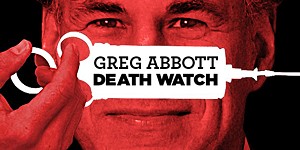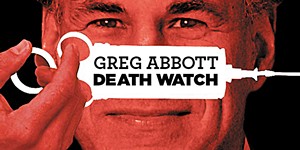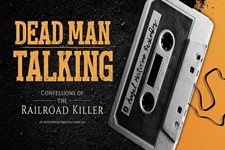Death Watch: Questions of Competence
Hatten ends appeals; advocates push to amend state DNA testing law
By Chase Hoffberger, 8:00AM, Thu. Oct. 9, 2014

Eighteen years of appeals are ended. In April, nearly two decades after being sentenced to death by the state of Texas, now-40-year-old Larry Hatten told his attorneys and a Corpus Christi court that he didn’t want to waste any more time with what he considered inevitable.
Hatten, a onetime drug dealer around the bayside city, was arrested Sept. 19, 1995, for the killing of Isaac Jackson. Angry over a rival dealer lighting his stepbrother’s BMW and Jaguar on fire, Hatten broke into the home of his friend Isaac Robinson – whom he believed had betrayed him – kicked open a bedroom door, and proceeded to fire six rounds from a .357 handgun into the bed, intending to shoot Robinson.
However, it was Robinson’s girlfriend Tabatha Thompson and their 5-year-old son Isaac Jackson who were in the bed. Thompson was struck four times but survived the shooting. Jackson, hit by a single bullet, didn’t. Hatten left the apartment and returned to the scene of the burning vehicles, where police, already on the lookout for his car, recognized and arrested him.
Hatten was charged with capital murder on Sept. 15, 1995, and sentenced to death in February 1996. Since, he’s filed a number of appeals – claiming unfair bias and insufficient counsel – but has been unsuccessful, save for a brief withdrawal of his name from the execution calendar last October after Houston attorney Kenneth McGuire, who represents Hatten, argued that his client (then set to die on Oct. 16) had suffered from mental illness for upwards of a decade and was not competent to be executed.
McGuire’s efforts were derailed in April when Hatten filed a motion to replace him and fellow attorney Joseph Barroso, alleging negligence and mental abuse from their neglect of duty. He eventually withdrew the motion, but only after testifying before Corpus Christi Judge Missy Medary that he was indeed mentally stable enough to make such a decision. Medary ordered one more evaluation to take place April 13. After being declared mentally competent, Hatten was given a final execution date: Wednesday, Oct. 15. He’ll be the 10th inmate executed this year, and 518th since the reinstatement of Texas’ death penalty in 1976.
DNA Test Before Testing
The state’s fight over a disputed DNA testing law continues. Last week, state Sen. Rodney Ellis, D-Houston, together with exonerated convict Michael Morton and members of the New York-based Innocence Project, met outside the Capitol building to lobby for a less restrictive interpretation of the law.
In 2011, the Legislature enacted a law intended to provide a broader right to DNA testing on crime scene evidence. However, the Court of Criminal Appeals has most recently interpreted Chapter 64 of the Texas Code of Criminal Procedure to require a defendant be able to prove that microscopic skin cells exist on a piece of courtroom evidence before any testing can be done. Using this interpretation, the CCA has previously denied Larry Swearingen the opportunity to test for DNA on the weapon used to kill Montgomery County Community College student Melissa Trotter.
The current stipulation raises more questions than it answers – such as: How can the naked eye prove a microscopic entity’s existence? Speaking outside the Capitol last Wednesday, Ellis and advocates urged lawmakers to once again amend the law, citing the CCA’s narrow interpretation. Morton, exonerated in part because of DNA testing after wrongly serving 20 years in prison for the murder of his wife, noted how, in his case, testing eventually helped solve two murders: DNA found on a bloody bandana near the house where his wife was killed was linked to Mark Alan Norwood, who was also later charged for the murder of Debra Baker.
“The one truth I have learned in my two decades’ work with the Innocence Project is that you simply can’t predict what DNA testing is going to reveal,” offered co-director Barry Scheck. “In Michael’s case, testing of a bloody bandana found near his home led police to real perpetrator Mark Alan Norwood. In other cases it has confirmed guilt. But when an investigative tool can shed light on a criminal prosecution, those seeking to prove their innocence should have broad access to it.”
Got something to say on the subject? Send a letter to the editor.
A note to readers: Bold and uncensored, The Austin Chronicle has been Austin’s independent news source for over 40 years, expressing the community’s political and environmental concerns and supporting its active cultural scene. Now more than ever, we need your support to continue supplying Austin with independent, free press. If real news is important to you, please consider making a donation of $5, $10 or whatever you can afford, to help keep our journalism on stands.
Sarah Marloff, Nov. 14, 2018
Chase Hoffberger, June 17, 2016
Jordan Smith, April 6, 2012
Nov. 16, 2018
Death Watch, Innocence Project











